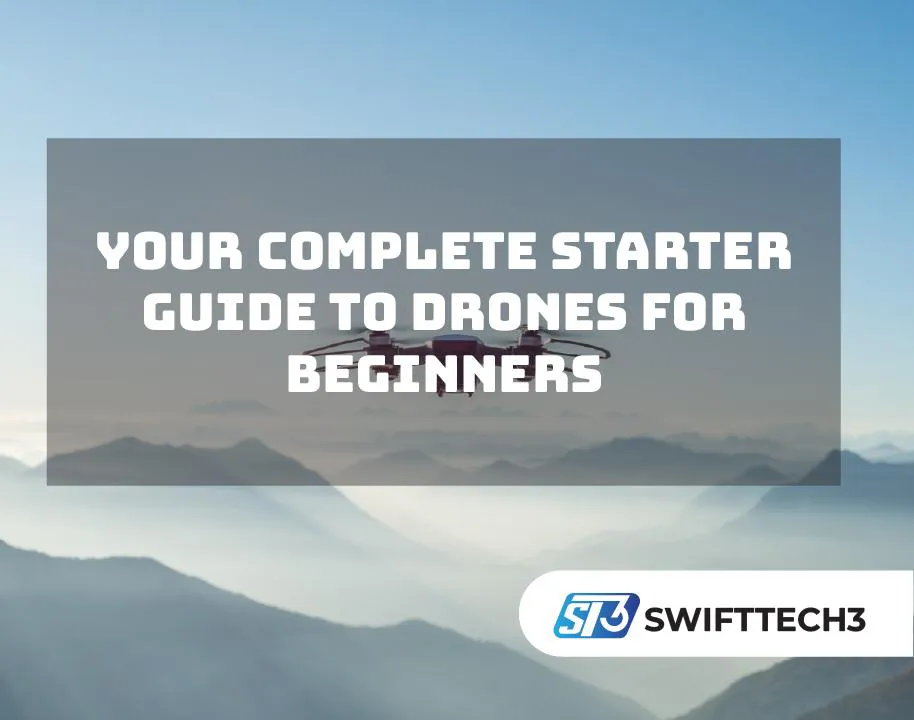Okay, so you’ve seen those tiny buzzing birds in the sky right? Those little things are drones, and people everywhere now wanna get one too. Maybe you’ve been scrolling TikTok or YouTube and see cool aerial shots and thought “I wanna do that too!” Well, good news — this guide on Drones for Beginners will help you start flying without going broke or crashing your new gadget into the neighbor’s tree (hopefully).
Drones used to be like crazy expensive tech toys for experts, but now they’ve gone full mainstream. Even cheap entry level drones have insane camera quality, GPS, and smooth flight control that just few years ago was only in pro models. That’s wild.
So whether you want to make travel vlogs, take cool aerial photos, or just learn drone flying for fun, I got you covered.
Why Everyone’s Obsessed With Flying Drones
There’s just somethin magical about flying your own lil machine in the sky. You see the world from a new angle. You control the horizon, literally.
Drones for beginners are easier now cause of all the smart stuff built in. You get automated flight modes, steady remote control, and long battery life. You can launch from your hand, press one button to land, and record stable video with built-in gimbals.
One of the best things about the hobby is you don’t even need to be a tech genius. Most beginner friendly drones are made so simple that even a 10-year-old can learn to fly in a day.
And man, the camera quality… even on small drones like Potensic Atom or the DJI Mini 4 Pro, you can shoot crispy 4K videos and post them instantly.
Important! Know the Rules Before You Fly
Alright, this part might be kinda boring but it’s super important. You can’t just fly anywhere you feel like, even if your drone looks like a toy.
If you’re in the U.S., the Federal Aviation Administration (FAA) got some rules. You gotta register your drone if it’s over 250 grams, and you can’t fly higher than 400 feet. Also, no flying near airports or crowded stadiums — they take that stuff seriously.
In some other countries, you need special permits or license if you fly big drones. If you’re using something light like DJI Flip or Potensic Atom, you might not need much paperwork, but still check local laws or you could get fined or worse, your drone confiscated.
Always fly where you can see your drone, not behind trees or buildings. Trust me, losing signal sucks and most likely you’ll lose your drone too.
How to Pick the Best Drone for Beginners
There’s like a million options online and most people get overwhelmed fast. Don’t worry, here’s how to choose a drone that won’t make you regret later.
1. Weight & Legal Category
If you’re new, start with something small and light. The DJI Mini 4 Pro is perfect cause it’s under 250g, means less rules, easy to carry, and stable in flight. Lightweight drones are also safer when (not if) you crash them.
2. Camera Quality
You probly want to take some amazing aerial photos, right? Then get a drone with at least 2.7K or 4K camera quality. Even entry level drones now shoot like professional ones. Look for mechanical gimbal or digital stabilization to reduce shaking.
3. Battery Life
Here’s the truth — battery dies fast. Like, super fast. Those 10 min flights go by in a blink. So when you buy, pick one that last atleast 20–30 mins and buy extra batteries too. Flying with one battery is like going on a road trip with quarter tank gas.
4. Flight Modes & Controls
Good drones got smart flight modes that make your life easy. For example, “return to home” mode brings the drone back automaticly when low battery. There’s follow-me, orbit, waypoint, and other automated flight settings that help you look like pro.
5. Durability
You’re gonna crash, no shame in that. So pick a drone that can take a hit. Replaceable props, guards, and spare arms are life savers.
6. Remote Control
Not all remote control setups are same. Some drones fly by your phone Wi-Fi, others with physical transmitter. Always prefer controller — it gives more range and less lag.
Best Drones for Starters
Here’s few models people swear by in drone reviews online.
| Drone | Why It Rocks | What’s Not So Great |
|---|---|---|
| DJI Mini 4 Pro | Lightweight, stable, long battery life, smooth flight control | Costly for total newbie |
| DJI Flip | Compact, folds tiny, crazy camera quality | Battery a bit short |
| Potensic Atom | Super beginner friendly, cheap, decent flight modes | Less camera sharpness in dark |
These drones balance everything — price, control, and fun. Even though the DJI Mini 4 Pro is bit pricey, it’s worth if you wanna get serious in flying.
How to Learn to Fly (Without Breaking Your Drone)
Alright, this part’s fun but also nerve wrecking first time. When you power up your drone, the lights flash, propellers spin, your heart beats fast. Don’t panic, here’s how to start easy.
Step 1: Ground Practice
Turn drone on, test flight control and get used to joystick directions. Try lifting it few feet, hold position, then land. Do that over and over till your thumbs know what to do automaticly.
Step 2: Hover and Rotate
Once you can keep it steady, practice turning 360°, moving forward and back, side to side. Keep your remote control slow and gentle. Fast jerks make crashes.
Step 3: Try Flight Paths
Most drones now have pre-set flight paths, like “circle me” or “follow mode.” These are great for practicing automated flight and cinematic moves. They also help you shoot smooth aerial photos without manual control stress.
Step 4: Keep it Safe
Avoid flying near trees, buildings, or people. Wind is your worst enemy as a beginner. Start with calm weather, trust me.
Step 5: Check Battery and GPS
Always check your battery life before taking off. Nothing worse than your drone dying mid-air. Make sure GPS is locked too before launch or it might drift away.
Common Mistakes Beginners Make
- Flying in strong wind or bad weather
- Forgetting to calibrate compass
- Ignoring firmware updates
- Not setting home point (so drone don’t know where to land)
- Overconfidence after one good flight
You gotta respect the process. Even seasoned drone pilot crash sometimes.
Pros and Cons of Starting with Entry-Level Drones
Pros
- Easier to control, beginner friendly
- Cheap to fix
- Light, safe, no license often needed
- Good way to practice and learn to fly
Cons
- Shorter battery life
- Not best camera quality in dark
- Less sensors so higher crash chance
- May not handle wind well
But hey, you’re learning. That’s what counts.
Real People Experience
I talked to few flyers online who started from scratch. One guy said he learned on a Potensic Atom, crashed like 4 times in a week but still flying it a year later. Another used DJI Flip and said its flight control was “buttery smooth” even for first timers.
That’s the thing about drones — you don’t need perfection to start. You just need patience and curiosity.
The Future of Beginner Drones
Bro, the future looks amazing. The new DJI Mini 4 Pro already pushing limits of what entry level drones can do. It’s got 360° obstacle sensors, long battery life, and AI-powered automated flight that makes filming way too easy.
Even budget models now have GPS tracking and return-to-home systems. It’s crazy how accessible it all became. Next step might be full voice control or AR-based flight paths, who knows!
Final Thoughts — Take Off and Just Do It
Flying drones ain’t just a tech hobby, it’s an art. You’re controlling something in the air, taking beautiful aerial photos, and seeing your world from new eyes.
So my advice? Don’t overthink. Pick something beginner friendly like the DJI Mini 4 Pro or Potensic Atom, charge that battery life full, and get outside. The first few flights will be scary, your palms sweat, maybe you crash once or twice… but you’ll get better fast.
Before long, you’ll be that confident drone pilot who knows how to control every move, plan flight paths, and shoot cinematic scenes with ease.
So go ahead — grab that remote control, power up your camera drone, and let the sky become your playground.

FAQ’s
If you’re just startin out, go for something light and beginner friendly like the DJI Mini 4 Pro or Potensic Atom. They got stable flight, easy remote control, and great camera quality without needin pro skills.
Most entry level drones give around 20 to 30 mins of battery life, but it really depends how you fly and what features you use. Always keep spare batteries — cause when you’re havin fun, time (and power) runs out quick!


